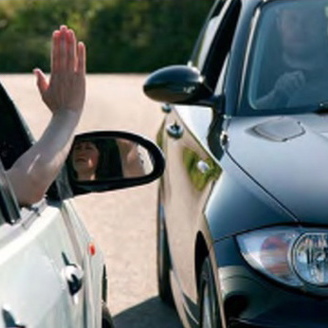Carmaker BMW has published the results of a UK-based study into the way people behave and feel while travelling in cars, both as drivers and passengers. The findings come in a report called "The Secret Life of Cars and What They Reveal About Us", which was commissioned to help BMW understand drivers' current and future needs.
The report, which can be downloaded here (3.3Mb), explores issues such as the way sign language (top image) has evolved so drivers can commnicate with each other - but notes that no satisfactory signal for "sorry" has emerged. It also finds that, with the rise of eating and drinking in cars, inadequate cupholders is one of the biggest sources of driver discontent (above).
Among other issues explored in the report - which involved research, focus groups, driver interviews and in-car observations over a four-month period - are attitudes to vehicle emissions and climate change, talking and even singing in cars and the relationships people have with their vehicles.
Above: where couples sit when they travel together. Below: BMW bodycolour preferences in the UK
The report explores the rituals of getting into and out of cars (men take an average of 8 seconds to get out, women 10 and families up to 10 minutes) and identifies new trends among car owners such as personalisation, regional colour preferences and "green-upmanship" - "a tendency to worry about whether their car looks 'un-green'.
It suggests that families are now likely to spend more time together in the car than anywhere else and that car journeys have replaced the "semi-mythical family mealtime" as the main point of communal experience.
The report was compiled by Not Actual Size.
Download the full report here (3.3Mb PDF file)

